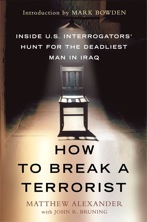

On “60 Minutes” tonight, Lara Logan interviewed former FBI agent Ali Soufan, one of the bureau’s chief interrogators of Al Qaeda suspects and other Islamic extremists after 9/11, who is now telling his story in the book “The Black Banners.”
Soufan discussed the tactics he employed, mostly knowledge and empathy, connecting on a human level with those he interrogated. That strategy was very effective in extracting information — until the CIA stepped in, pushed Soufan and his colleagues aside, and started using “enhanced interrogation techniques” (torture). As Soufan points out, those techniques were less successful, which is why suspects like Abu Zabaydeh (who had been cooperating and providing useful intel earlier) clammed up despite being waterboarded dozens of times.
Soufan’s explanation of the way he successfully got terrorists to open up sounded remarkably like what I heard from another chief interrogator, a member of the US military who used the pen name Matthew Alexander when he wrote the book “How To Break A Terrorist,” in which he described his own experiences in helping to capture Abu Musab Al-Zarqawi [you can listen to my 2008 conversation with Alexander here]. Alexander, like Soufan, was an outspoken critic of using torture on detainees because it was not as effective as developing relationships with those he wanted information from — and it helped to know Islamic culture and history, which the CIA agents who took over were not steeped in.
These are guys who know more about the subject than any pundit or politician, including those who made the policies that injured America’s image in the world. Soufan and Alexander were on the front lines, face to face with the enemies who wanted to destroy us, and they were winning. Why would you pull them out?
